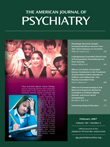Lithium in Breast Milk and Nursing Infants: Clinical Implications
Abstract
Objective: Current practice guidelines discourage use of lithium during breast-feeding, despite limited data. This study aimed to quantify lithium exposure in nursing infants. Method: In 10 mother-infant pairs, the authors obtained assays of lithium in maternal serum, breast milk, and infant serum and indices of infant renal and thyroid function. Results: Maternal serum, breast milk, and infant serum daily trough concentrations of lithium averaged 0.76, 0.35, and 0.16 meq/liter, respectively, each lithium level lower than the preceding level by approximately one-half. No serious adverse events were observed, and elevations of thyroid-stimulating hormone, blood urea nitrogen, and creatinine were few, minor, and transient. Conclusions: Serum lithium levels in nursing infants were low and well tolerated. No significant adverse clinical or behavioral effects in the infants were noted. These findings encourage reassessment of recommendations against lithium during breast-feeding and underscore the importance of close clinical monitoring of nursing infants.



